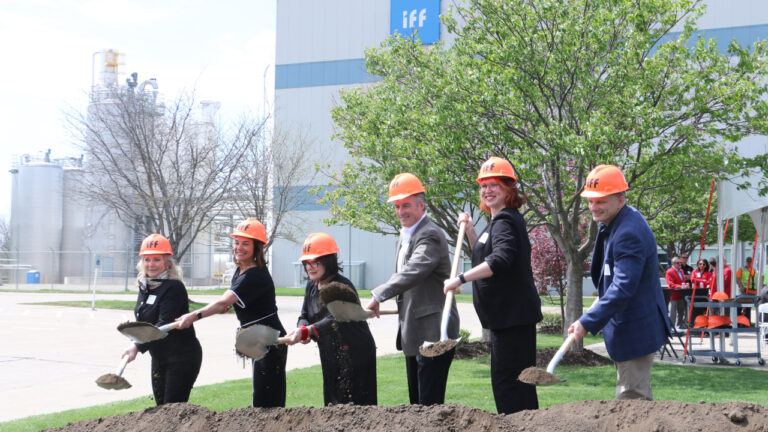U.S. Sen. Joni Ernst defended President Donald Trump’s trade negotiation style and expressed optimism about passage of the U.S.-Mexico-Canada Agreement and ongoing negotiations with China over lifting tariffs at a town hall in Williamsburg in April. PHOTO KATHARINE CARLON
By Katharine Carlon
[email protected]
WILLIAMSBURG — Compelling stories are key to moving the Trump administration to end a trade war that impacts one in five Iowa jobs, U.S. Sen. Joni Ernst told a business-focused town hall audience in April.
Stories were just what the senator got, as farmers, manufacturers and business owners painted a dispiriting, sometimes panicked picture of how multiple rounds of tariffs and retaliatory tariffs have negatively impacted their bottom lines and the state’s overall economic health.
Richard Dix is senior director of supply chain for Kinze Manufacturing, Inc., which hosted the April 24 event organized by grassroots-coalition Tariffs Hurt the Heartland. He spoke of the “flow down” effect of retaliatory steel and aluminum tariffs, in place since the Trump administration’s decision last year to levy tariffs on metal imports from Canada, Mexico and the EU.
They’ve put Kinze in the difficult position of deciding whether to pass the higher cost of materials onto customers, and siphoned away money that would have otherwise been invested in new products, jobs and markets, Mr. Dix said.
Jeff Quint, owner and founder of Cedar Ridge Winery & Distillery in Swisher, said his company is now “treading water” after being forced to pause plans to export its Iowa corn-made whiskey to Europe and China. And Barbra Solberg, public policy strategist for the Cedar Rapids Metro Economic Alliance, lamented the city, often called an “ag-manufacturer town,” has been hit with a “double whammy” of retaliatory steel and aluminum tariffs and those on nearly all U.S. agricultural food exports.
“Tariffs are killing us and trade wars are not easy to win,” said Pam Johnson, a Floyd County corn and soybean farmer and former president of the National Corn Growers Association. “I lived through the farm crisis of the ‘80s and watched parents tell their kids, ‘Don’t come back and make a better life somewhere else where you can have a good job and health insurance.’ I’m starting to feel that again now with the uncertainty that’s out there in the countryside.”
Ms. Ernst, who sat in on a panel with farmers, business owners and manufacturers at Kinze’s Williamsburg facility and later spoke at a town hall, promised to take those stories and others back to Washington in hopes of ending the trade war as soon as possible
“I have talked to the president recently about this and shared these real-life stories about the effects tariffs are having all across our wonderful state,” Ms. Ernst said, adding she is hearing from a number of young farmers who have had to take full- and part-time jobs off their farms to make ends meet. “Our younger generation can no longer afford to stay on the family farm … and our manufacturers are having to make very hard decisions due to increased input costs and lowered sales, especially like folks here at Kinze and the ag equipment industry.”
Carrie Clark Phillips, speaking on behalf of Americans for Free Trade, a group representing more than 80 business associations across the country, said the trade war has had a profound and negative effect on Iowa’s economy. Ms. Phillips said that since tariffs were first imposed in June 2018, Iowa businesses have paid an extra $73 million dollars on import tariffs – $19 million of that in December alone, about eight times the amount paid in December 2017.
Dennis Slater, president of the Association of Equipment Manufacturers, which helped put together the 200-member Tariffs Hurt the Heartland coalition, likened tariffs to a tax – one that is only hitting U.S. businesses and consumers.
“China is not paying the tax,” he said. “We are paying the tax.”
Reversing that impact begins with ratification of the U.S.-Mexico-Canada Agreement (USMCA), Ms. Ernst said, adding that measure must be accompanied by the concomitant lifting of tariffs on our trading partners. USMCA has broad bipartisan support, she added, although Congress is still waiting for the Trump administration to submit the trade deal to Congress, which starts the clock running on votes in the House and Senate.
Ms. Ernst said she has also reintroduced the Trade Security Act, which would require the Department of Defense to justify the national security basis for new tariffs under Section 232, in effect stripping the president of the ability to levy such tariffs unilaterally.
“Who better to determine what’s actually a national security threat than the Department of Defense?” she said. “Increasing congressional oversight over the use of these tariffs will help the president make decisions that actually do support American jobs while supporting our national security.”
Talks with China continue
As for ongoing negotiations with China, Ms. Ernst said she had recently spoken with U.S. Trade Representative Robert Lighthizer to stress the importance of trade to Iowa farmers, hard hit by tariffs on pork and soybeans. China has levied high tariffs on U.S. soybeans for nearly a year in response to $200 billion in tariffs President Donald Trump placed on Chinese goods, slowing soybean sales to a trickle. The country has purchased around 12.7 million tons of soybeans from the U.S. since tariffs were imposed, according to U.S. Department of Agriculture data, versus more than 28.5 million tons the previous year.
One-off soybean and pork purchases have filled some of the gap, but not enough, Ms. Ernst said, vowing to continue to push the Trump administration to find solutions quickly. While she expressed some frustration that action was not happening fast enough, she said she still had confidence progress was being made and dismissed questions about the president’s aggressive negotiating style.
“I do have to remind people the president has a different style of negotiating. He throws the worst-case scenario out there as a starting point for negotiations and then will work his way towards the middle with whoever he’s negotiating with,” Ms. Ernst said. “What we have seen is he will make a threat on tariffs but then he won’t necessarily act on it … I do see that we are coming to an end of negotiations. I do see that there is that light at the end of the tunnel.”
For farmer Pam Johnson, however, that light is looking increasingly dim.
“We’ve talked about the light at the end of the tunnel, but I feel that we’ve had the rug pulled out from under us so many times now that the uncertainty is stronger than ever,” she said. “Can we get USMCA passed? Can we get it over the finish line with this Congress?”
John Heisdorffer, former president of the American Soybean Association, said he worries that even if the tariff issues are ultimately resolved, some trade is now lost forever. On a trip to Brazil last summer even before tariffs were imposed, he said, the country planned to open an additional 18 million acres to soybean farming by 2025, a process he expects to see accelerated in light of the trade war.
“We more or less handed them our soybean exports,” he said. “We’ve got some real competition out there … and we’ll never get 100 percent of our exports back.”
Ms. Ernst urged Mr. Heisdorffer and others to continue advocating with calls and letters to legislators – and especially the White House – to end the trade impasse.
“I’ve asked everybody to support me with stories and impacts on individuals, whether you’re an employer, manufacturer, an end purchaser of a new piece of equipment – tell me what those tariffs are doing to you, to your family, to your business,” she said. “Those are the stories that I can take to the administration and say, ‘Trade Rep Lighthizer, this is an Iowa family that’s struggling because of this policy and this will help if you remove the tariffs.’ I have to be able to show in examples what is happening because of these tariffs.” CBJ







